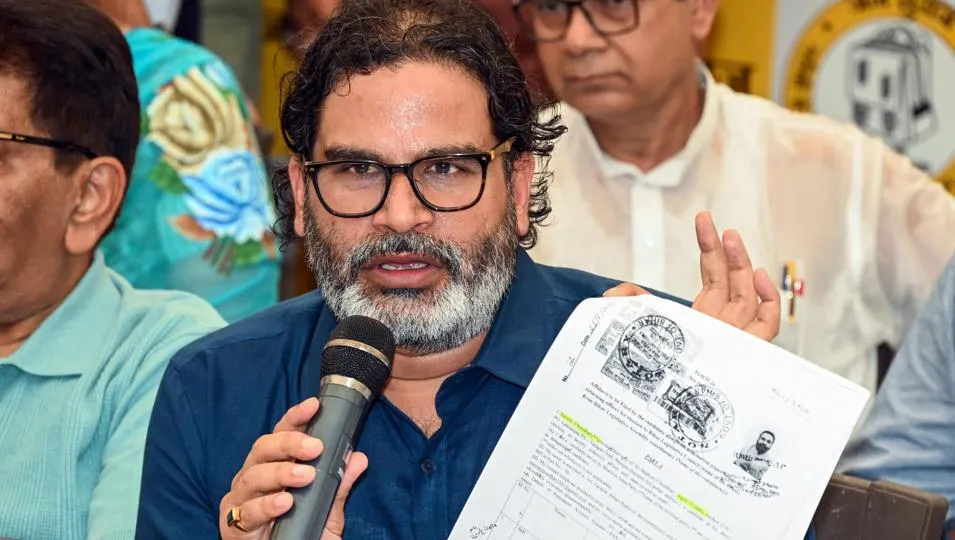Prashant Kishor Skips Bihar Polls 2025: Party Focus

Prashant Kishor Opts Out of Bihar Elections 2025: Focuses on Jan Suraaj Party Building

In a pivotal announcement ahead of the Bihar Assembly elections 2025, Prashant Kishor, the renowned political strategist and founder of Jan Suraaj Party, has confirmed he will not contest the polls. Instead, Kishor emphasized his commitment to strengthening the party's organizational framework, a decision unanimously endorsed by Jan Suraaj to prioritize long-term growth over personal electoral ambitions. This move dispels months of speculation surrounding his potential candidacy from key constituencies like Kargahar or Raghopur, allowing him to channel efforts into grassroots mobilization across Bihar.
Kishor's choice underscores a strategic pivot for Jan Suraaj, which is making its electoral debut in the high-stakes Bihar polls. By stepping back from direct contention, he aims to mentor emerging leaders and ensure the party's message resonates statewide. The Bihar elections 2025, slated for two phases on November 6 and 11 with results on November 14, represent a battleground where traditional alliances like NDA and Mahagathbandhan face a fresh challenger in Jan Suraaj, contesting all 243 seats independently.
The party's rapid candidate announcements—now totaling 116 seats—signal confidence in its diverse slate, blending professionals, activists, and underrepresented voices. Kishor's vision for Bihar, rooted in anti-corruption and development reforms, positions Jan Suraaj as a potential disruptor in the state's polarized politics.
Kishor's Rationale and Party's Strategic Shift
"No, I won’t contest. The party has decided… I will continue to do the work I have been doing in the party. I will continue with the organisational work for the larger interest of the party," Kishor stated in an exclusive interview with PTI on October 15, 2025. This candid revelation came amid swirling rumors, fueled by his earlier hints at entering the fray from his birthplace Kargahar or the Yadav stronghold of Raghopur. However, Jan Suraaj's candidate lists quashed those prospects, nominating Ritesh Ranjan Pandey for Kargahar and Chanchal Singh for Raghopur, directly challenging RJD's Tejashwi Yadav.
Kishor's decision is not merely personal but a calculated strategy to fortify Jan Suraaj's infrastructure. Founded in 2022 after his padyatra across Bihar, the party has grown into a formidable force, emphasizing merit-based selections over dynastic politics. By avoiding the spotlight of a single seat, Kishor can traverse the state, rallying volunteers and refining campaign tactics. He elaborated that contesting would "distract" from essential tasks like voter outreach and policy dissemination, crucial for a debutant outfit in the Bihar elections 2025.
This approach aligns with Kishor's track record as a mastermind behind victories for parties like BJP in 2014 and JD(U) in 2015. Now, as a politician, he is betting on collective strength rather than individual charisma. Jan Suraaj's national president, Uday Singh, reinforced this, noting the party's focus on "capable individuals who have served the people," a criterion that guided the selection process.
Jan Suraaj's Candidate Lineup: A Diverse Slate
Jan Suraaj has aggressively rolled out its nominees, becoming the first major player to declare for over 100 seats in the Bihar Assembly elections 2025. The initial list of 51 candidates, unveiled on October 9, featured a mix of academics, artists, and professionals, including 16% Muslims and significant representation from Extremely Backward Classes (EBCs). The second tranche of 65, announced on October 13, pushed the tally to 116, with more to follow soon.
Notable picks include mathematician K.C. Sinha from Kumhrar in Patna, whose textbooks have educated generations of Bihari students; Bhojpuri singer Ritesh Ranjan Pandey from Kargahar, bringing cultural appeal; and Dr. Jagriti Thakur from Morwa in Samastipur, granddaughter of socialist icon and former Chief Minister Karpoori Thakur. Other standouts are Priti Kinnar, a transgender candidate from Bhorey (SC) in Gopalganj, symbolizing inclusivity; Y.B. Giri, a senior advocate from Manjhi; Dr. Lal Babu Prasad from Dhaka; Dr. Amit Kumar Das from Muzaffarpur; and R.K. Mishra, retired Director General of Home Guards, from Darbhanga.
In a bold move, the party fielded Kamlesh Paswan from Harnaut, a seat long associated with CM Nitish Kumar, though he hasn't contested there in decades. Chanchal Singh's nomination for Raghopur pits Jan Suraaj directly against Tejashwi Yadav, whom Kishor had previously warned of an "Amethi-like defeat," alluding to Rahul Gandhi's 2019 loss. Kishor justified these choices: "Our candidates are selected based on their contributions to society. Voting for them is the responsibility of Bihar's people."
- K.C. Sinha (Kumhrar): Renowned mathematician and former Patna University Vice Chancellor.
- Ritesh Ranjan Pandey (Kargahar): Popular Bhojpuri artist connecting with rural voters.
- Dr. Jagriti Thakur (Morwa): Heir to Karpoori Thakur's legacy, focusing on social justice.
- Priti Kinnar (Bhorey): Transgender activist advocating for marginalized communities.
- Kamlesh Paswan (Harnaut): Challenging Nitish Kumar's influence in a key seat.
- Chanchal Singh (Raghopur): Fronting the battle against Tejashwi Yadav.
This eclectic mix—31 from EBCs, 21 OBCs, and 21 Muslims so far—aims to dismantle caste-based voting patterns that dominate Bihar politics. Jan Suraaj's pledge to contest every seat underscores its ambition to emerge as a third force, potentially fragmenting votes from both NDA and Mahagathbandhan.
Political Ripples and BJP's Sharp Retort
Kishor's announcement has sent ripples through Bihar's political circles, with rivals quick to interpret it as a sign of vulnerability. The Bharatiya Janata Party (BJP), part of the ruling NDA, seized the moment for a pointed critique. BJP leader Pradeep Bhandari posted on X: "Prashant Kishor knows that his party has negligible electoral impact on ground in Bihar! He refuses to contest as a candidate because he knows he will lose deposits if he does so! Jan Suraaj, RJD, Congress all know the ground in Bihar: People of Bihar are with NDA."
This jibe highlights NDA's confidence, bolstered by its current hold of 131 seats in the 243-member assembly—BJP (80), JD(U) (45), Hindustan Awami Morcha (4), and two Independents—against Mahagathbandhan's 111 (RJD 77, Congress 19, CPI(ML) 11, CPI(M) 2, CPI 2). Recent NDA seat-sharing, with BJP and JD(U) each claiming 101, has stabilized the alliance despite minor frictions, like Upendra Kushwaha's initial discontent.
Kishor, undeterred, fired back as a strategist, forecasting NDA's defeat and JD(U)'s collapse to under 25 seats, citing internal chaos and historical precedents like Chirag Paswan's 2020 revolt. He lambasted both alliances: "Complete chaos in NDA over seats; endless tiffs in INDIA bloc between RJD and Congress, with Vikassheel Insaan Party's status unclear." This narrative positions Jan Suraaj as the viable alternative, promising to elevate Bihar to the top 10 developed states if it secures over 150 seats—or continue street-level activism if it falls short.
Bihar Elections 2025: Broader Context and Stakes
The Bihar Assembly elections 2025 unfold against a backdrop of economic aspirations and social divides. With a burgeoning youth population and persistent issues like unemployment, migration, and infrastructure deficits, voters seek transformative governance. Jan Suraaj's campaign, launched dramatically from Raghopur on October 11 amid enthusiastic crowds, critiques the "thagbandhan" (cheat alliance) of NDA and attacks Mahagathbandhan's reliance on caste arithmetic.
Key battlegrounds include Patna's urban seats like Kumhrar, where Sinha's intellectual heft could sway educated voters, and rural strongholds like Morwa, leveraging Thakur's legacy for backward classes. Harnaut's contest against Nitish Kumar's shadow tests Jan Suraaj's penetration into JD(U) bastions. Meanwhile, Raghopur remains a flashpoint, with Chanchal Singh's challenge to Tejashwi Yadav amplifying Kishor's earlier barbs.
Nationally, the polls gauge PM Modi's post-2024 Lok Sabha momentum and Nitish Kumar's alliance flips. For opposition, it's a litmus test for INDIA bloc cohesion. Jan Suraaj's independent run, ruling out alliances as per March 2025 statements, could siphon anti-incumbency votes, altering outcomes in close races.
Kishor's organizational focus includes padyatras, youth wings, and policy workshops, aiming for a 150-seat breakthrough or a respectable debut. "We will either win handsomely or face a drubbing—nothing in between," he asserted, framing the Bihar elections 2025 as a mandate for change or a call for persistence.
Implications for Bihar's Political Future
Kishor's non-contest amplifies Jan Suraaj's narrative as a movement, not a personality cult. It allows him to critique freely, as seen in his NDA doom predictions and calls for Bihar's transformation. If successful, Jan Suraaj could redefine state politics, prioritizing governance over patronage. A poor showing might relegate it to fringe status, but Kishor's resilience suggests sustained agitation.
For rivals, it's a wake-up call. BJP's taunts mask concerns over vote splits; RJD eyes retaining Yadav loyalty in Raghopur. As campaigns intensify, issues like women's safety, education, and economic revival will dominate, with Jan Suraaj's fresh faces offering a counter to veteran fatigue.
Ultimately, the Bihar elections 2025 hinge on turnout—projected high at 65%—and youth engagement. Kishor's gamble on organization over candidacy could either forge a new era or reinforce old guard dominance. As November approaches, Bihar watches intently, weighing continuity against the promise of suraj (sunrise).
Comment / Reply From
No comments yet. Be the first to comment!










